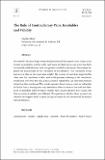Files in this item
The rule of contradictory pairs, insolubles and validity
Item metadata
| dc.contributor.author | Read, Stephen | |
| dc.date.accessioned | 2020-11-10T09:30:09Z | |
| dc.date.available | 2020-11-10T09:30:09Z | |
| dc.date.issued | 2020-10 | |
| dc.identifier | 270911578 | |
| dc.identifier | bc20f19a-e988-43d0-aa85-755df9f591f1 | |
| dc.identifier | 85079459556 | |
| dc.identifier | 000589851400005 | |
| dc.identifier.citation | Read , S 2020 , ' The rule of contradictory pairs, insolubles and validity ' , Vivarium , vol. 58 , no. 4 , pp. 275-304 . https://doi.org/10.1163/15685349-12341388 | en |
| dc.identifier.issn | 0042-7543 | |
| dc.identifier.other | ORCID: /0000-0003-2181-2609/work/82788877 | |
| dc.identifier.uri | https://hdl.handle.net/10023/20938 | |
| dc.description | The present work was funded by Leverhulme Trust Research Project Grant RPG-2016-333. | en |
| dc.description.abstract | The Oxford Calculator Roger Swyneshed put forward three provocative claims in his treatise on insolubles, written in the early 1330s, of which the second states that there is a formally valid inference with true premises and false conclusion. His example deployed the Liar paradox as the conclusion of the inference: ‘The conclusion of this inference is false, so this conclusion is false’. His account of insolubles supported his claim that the conclusion is false, and so the premise, referring to the conclusion, would seem to be true. But what is his account of validity that can allow true premises to lead to a false conclusion? This paper considers Roger’s own account, as well as that of Paul of Venice, writing some sixty years later, whose account of the truth and falsehood of insolubles followed Roger’s closely. Paul endorsed Roger’s three claims. But their accounts of validity were different. The question is whether these accounts are coherent and support Paul’s claim in his Logica Magna that he endorsed all the normal rules of inference. | |
| dc.format.extent | 30 | |
| dc.format.extent | 559339 | |
| dc.language.iso | eng | |
| dc.relation.ispartof | Vivarium | en |
| dc.subject | Contradiction | en |
| dc.subject | Validity | en |
| dc.subject | Signification | en |
| dc.subject | Aristotle | en |
| dc.subject | Roger Swyneshed | en |
| dc.subject | Paul of Venice | en |
| dc.subject | B Philosophy (General) | en |
| dc.subject | T-NDAS | en |
| dc.subject.lcc | B1 | en |
| dc.title | The rule of contradictory pairs, insolubles and validity | en |
| dc.type | Journal article | en |
| dc.contributor.sponsor | The Leverhulme Trust | en |
| dc.contributor.institution | University of St Andrews. Philosophy | en |
| dc.contributor.institution | University of St Andrews. Arché Philosophical Research Centre for Logic, Language, Metaphysics and Epistemology | en |
| dc.contributor.institution | University of St Andrews. St Andrews Institute of Medieval Studies | en |
| dc.identifier.doi | https://doi.org/10.1163/15685349-12341388 | |
| dc.description.status | Peer reviewed | en |
| dc.identifier.grantnumber | RPG-2016-333 | en |
This item appears in the following Collection(s)
Items in the St Andrews Research Repository are protected by copyright, with all rights reserved, unless otherwise indicated.

